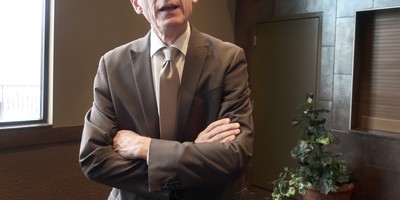WASHINGTON - President Obama's acceptance of a Republican plan to continue President George W. Bush's tax cuts for two more years, and a 2 percent payroll tax cut through 2011, is a complete capitulation to GOP demands that he change course.
In a total reversal of his campaign pledge that he would repeal the Bush tax cuts for wealthier taxpayers, Obama's decison would not only leave all the tax rate cuts in place through his term in office, it would cut Social Security taxes for workers at every income level, too. Republicans had pushed both tax proposals this year in their Pledge To America election agenda.
Let's be clear, this was no change of heart on his part about how to grow the economy. It was a cold, calculated, political decision to save his presidency in the face of a snail's pace economic growth rate that his advisers said was not going to get much better.
If further evidence was needed that his stimulus spending policies have failed in every respect, the minuscule 39,000 jobs created last month proved it in spades.
When you deduct the jobs produced in the health care and social services sectors, which are heavily dependent on federal funding, the private sector essentially produced no new jobs for our country's woefully underemployed workforce.
Despite wildly exaggerated forecasts that last week's labor report would show 170,000 to 200,000 net new jobs, it revealed a bleak jobs climate that pushed unemployment to 9.8 percent, and to 17 percent when discouraged workers, who dropped out of the labor force, and reluctant part timers were factored into the data.
Recommended
Obama was conveniently out of the country visiting the troops in Afghanistan when the jobs bombshell hit. The White House offered no explanations for the lastest sign that it's so-called stimulus policy was creating few if any jobs. Democrats, still shell-shocked after last month's devastating election losses, were more dispirited than ever, and more unpopular than ever, according to the polls.
Obama's approval numbers suffered, too. A Gallup Poll released Monday gave Bush a slightly higher approval rating (47 percent) that was one point higher than Obama's job approval score.
The nation's unemployment rate was 4.7 percent under Bush at the end of 2007, just before the economy went into a steep nosedive in 2008 as a result of the subprime mortgage crisis.
Now, Bush's across-the-board tax cuts -- the centerpiece of his fiscal policies that kept the economy running through several crises -- are at the center of a furious debate on how to pull the country out of a still lingering recession.
After two long jobless years, Obama's naive belief that we could spend our way out of the recession remains widely discredited, with little or nothing to show for his efforts but $3 trillion of additional debt.
Now, with federal forecasters, including the Federal Reserve Board, predicting several years of painfully slow economic growth, Obama is abandoning his failed policies and buying into the GOP economic playbook that he has condemned throughout his presidency.
What changed his mind? Certainly the pounding Democrats took in last month's elections represented a massive rejection of his anti-growth economic policies. Worse than that, the realization that the feeble job numbers would not change anytime soon, threatening to make him a one term president.
But the Labor Department's report that the economy had added only 39,000 jobs in November was the killer that finally forced him to cave on his plan to raise taxes on the rich. A report from the Social Security Administration said the private economy would have to produce more than 200,000 jobs a month to lower unemployment to 8 percent or less by 2012. The Fed was even more bearish on the jobs front.
In an interview on CBS's "60 Minutes" Sunday, Fed Chairman Ben Bernanke urged Congress to enact tax cut incentives to boost job growth "by closing loopholes and lowering (tax) rates for businesses and individuals. It would take four or five years for the unemployment rate to fall to 5 or 6 percent -- still far from Bush's 4.7 percent.
But something closer to home also forced Obama to compromise with Republican leaders: Senate Democrats were deserting him left and right on the Bush rate cuts.
When the recent House bill to raise taxes on individuals, families and small businesses came up for a vote in the Senate on Saturday, five Democrats joined with Republicans to kill it: Sens. Joe Manchin III, W.Va., James Webb, Va., Ben Nelson, Neb., Russell Feingold, Wis., and Joseph Lieberman, Conn., an Independent who remains in the Democatic caucus.
Will Obama's p;olicy reversal save his presidency? A turnaround in the economy could win back some of the independents who fled from the Democrats in droves on Nov. 2, but at a cost of losing party liberals who are accusing him of betrayal.
But if the compromise package passes and Obama signs it, the Republicans will get the credit for forcing his hand. Then it's on to the president ial election in 2012 when 23 Democratic Senate seats will be at stake versus only 10 GOP seats. The Republicans may need a gain of just two or three to take control of the Senate, too.
























Join the conversation as a VIP Member